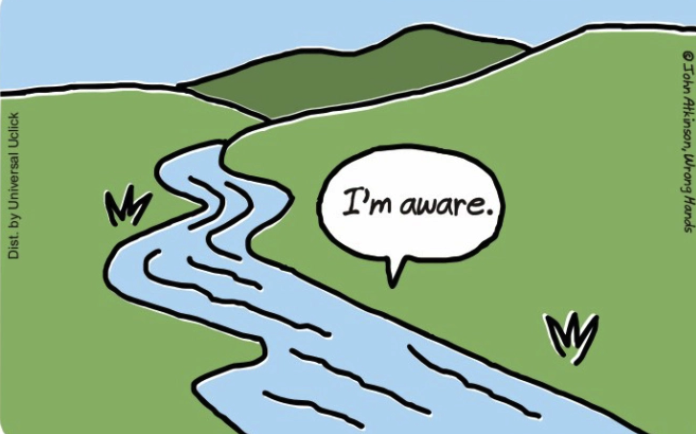I say “ily” when I hang up the phone. I find it endearing— maybe because I’m not the kind of person who says “I love you” out loud. Not often, anyway. I’ll toss “ily” around, though, and I’m sorry to admit this to anyone who’s been on the receiving end, but those three letters carry zero weight for me. “I love you” is precious. Shakespearean. Our grandparents said it in the ’60s; it’s a prophecy, a promise. “ily” drains it of its weight. Maybe these 4,000 “ily”s will eventually add up to the value of one “I love you.” But “ily” is a phonetic shortcut. A cheap copout. Not the same.
It began with “idc,” “lol,” “wyd,” and “kk,” born in a digital age from the need for quick, efficient texting. Now, these fragments have bled into everyday conversation. We barely speak in complete sentences, and language has undergone a kind of social minimalism, narrowing human interaction down to fragments and words containing fewer than five letters. In English class, we’re challenged to use two words to describe how we feel. Every time, though, the response is “tired and stressed.” In Latin, we have a similar routine. Quid sentis hodie (how do you feel today)? Fessus. Laeta. Tired. Happy. And I think we only say “happy” because there’s no Latin word for “stressed.” Sure, these tight parameters are expected to produce underwhelming responses, but even outside the classroom, I don’t think I’ve ever responded to “how are you?” with anything other than “good” (occasionally “fine,” if in complete distress).
Inadvertently, we’ve been trained to cut out the complexities of emotion, sacrificing depth for simplicity: fine, good, same. A truncated vocabulary leaves us analyzing text punctuation (only our generation knows the implications of a text period) and stuck in a world unevolved past surface level interaction. A rich vocabulary is not an essential component for genuine interactions, but with such weightless means of expression, every interaction turns into a diluted rehearsal.
This straitjacket of small talk is killing our generation. More and more I am consciously condensing my thoughts— and subconsciously editing nuance out of conversation. Now, when I start to dig into a point, I cut my thoughts with a cheery “you know?” hoping my poor listener will submit to my subtle, desperate plea. They agree 98% of the time, quickly dissolving any meaningful progression in our discussion. I’m not sure why we suppress how we feel. I like to talk and generally crave conversation. So this week, I swore off small talk. Free from the comfort of niceties, I went for the jugular, as my English teacher says, in every interaction.
I casually confessed my crushes to classmates, explained my root canal in depth to a teacher I barely talk to, and admitted my failures, hopes, and hot takes to girls that seem to hate me for reasons unknown. I got mixed reactions. A lot of blank stares. Awkward laughs. While uncomfortable for some, I didn’t really care: my days felt brighter, more purposeful.
While painful, small talk and brief encounters are pillars of our society. It’s why you’re never really alone, because there’s always someone willing to smile at you at a stoplight or discuss your favorite series at Barnes & Noble. Small talk is important, but with our words carrying less weight, we need to reevaluate the standard of interaction. Our predictable behavior in these instances functions as a defense mechanism, a way of avoiding the vulnerability of deeper, more meaningful conversation.
But how do you tell your friend that you hate who they are on the weekend? How do you divulge your fear of the future, the unknown, of death? How do you pry at the grip of your parents? You slam a door. You ignore a call. You suppress your stress. Some things are easier left unsaid, but at what cost? I worry we’ve lost all sense of honesty with each other. Have we become too sensitive for real conversation? Is it easier to just speak in filler words? Maybe. The people I know who are truly honest all the time, I hate. We haven’t been prepared to deal with that kind of bluntness. I savor the sugar coat, and I let the crunch of sweetness between my teeth distract my taste buds from the sour sting of critique. If I’m honest, I really can’t take criticism unless it’s in sandwich form.
As the Class of 2026 moves into their senior year, I hope we jump at our last chance to move past formalities. To speak with weight, rather than words. To lead with sincerity. We’ve spent years walking the same halls, brushing past each other with nods and passing comments. We grew up together, through the most developmental years of our lives, yet we neglect the hard conversations and the hard questions. We miss the opportunity to disagree, to fight, to form real friendships. Language, in its purest, most intentional form, is the bridge to deeper understanding, so long as we stop biting our tongues. It’s what’s left unspoken that’s holding us back. In this void, we miss the chance to be seen, heard, and understood. And words, without weight, disappear.
Edited by Bethany Chern



